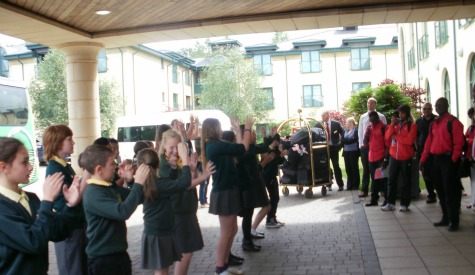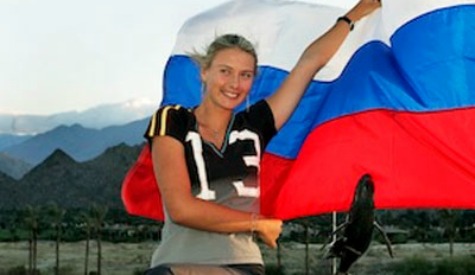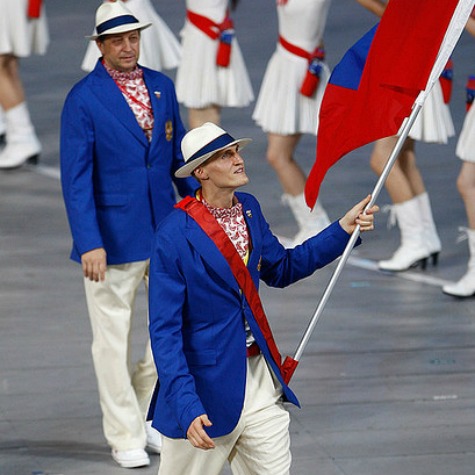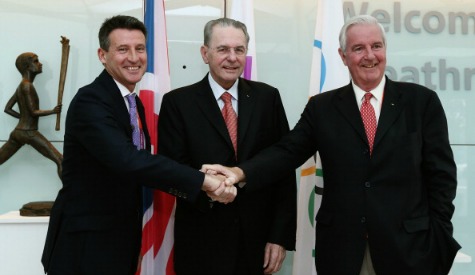 Trinidad and Tobago Olympic Committee(TTOC) president Larry Romany will attend the opening of the T&T cultural village.
Trinidad and Tobago Olympic Committee(TTOC) president Larry Romany will attend the opening of the T&T cultural village.
" Over the years the TTOC tried to encourage the Tourism authorities to use the opportunity of the Olympic games to showcase T&T. We saw other countries use the occasion and felt that T&T was missing out . I am happy that His Excellency Garvin Nicholas believed that the combination of the Olympics and the 50th anniversary of our Independence presented an opportunity not to be missed." said Romany T&T will host a culture fest in London during the 2012 Olympic games. The event will be held at the Tricycle Theatre in Kilburn, London, and will be facilitated by T&T High Commissioner to London Garvin Nicholas and will run from 26 July to August 25 .
The venue is only 20 minutes from the Olympic Village by train. The festival will include a number of children’s workshops. In addition there will be workshops on preparation of local foods , drumming and a variety of other activities for children.
The festival will put the spotlight on T&T’s culture and talent and cuisine. There will be booths with local foods such as bake and shark, curry, sada roti, local soups and a Creole kitchen.
GAMES
Athletes leave for Olympic Village tomorrow
 THE Trinidad and Tobago Olympic contingent will leave their camp in Wales tomorrow for the Olympic Village in London as the countdown to Friday’s opening of sports’ biggest stage continues.
THE Trinidad and Tobago Olympic contingent will leave their camp in Wales tomorrow for the Olympic Village in London as the countdown to Friday’s opening of sports’ biggest stage continues.
Chef de Mission, Annette Knott, has already arrived at the Village and is ensuring everything is in place for when this country’s athletes decamp.
Speaking to Newsday yesterday, Dexter Voisin, manager, TT athletics team, revealed that the athletes’ preparations have intensified even further. He noted that although the opening ceremony for the London Games is less than a week away, the athletes are focussed primarily on their training.
“In terms of training, they are still in their final preparation and placing emphasis on their events. The mood will change when we go to the Village but for now they’re just focussed on their preparation,” Voisin said.
While in their downtime, however, Voisin revealed that a room has been set aside at the Vale Hotel in Wales for the athletes to relax. There are pool tables, video games and other forms of entertainment available for the athletes to unwind and enjoy themselves.
Meanwhile, Voisin expressed satisfaction with what he has seen from the TT relay teams at their training sessions at the Wales Track and Field Stadium. This country 4x100 men picked up silver at the Beijing Olympics in 2008 and the World Championships a year later and expectations are high for the Women’s 4x100m and Men’s 4x400m teams to pick up a medal.
“They practiced yesterday (Sunday) and will practice again today (Monday). This is the first time in a major tournament really that we’ve got to do baton practice.
“Usually the focus is on preparing for your individual event first but this is the benefit of having a camp,” the manager declared.
Citing the disastrous efforts by the US men and women’s 4x100m teams at the 2008 Olympics where the baton was dropped in each race, Voisin argued that one can not take anything for granted when it comes to relays. He noted that TT have improved significantly in their transition of the baton especially the 4x100m men who have gotten ample time to practice.
Commenting on the efforts of our athletes at the Welsh Athletics International last week, Voisin was delighted that they were able to get some competitive action under their belt but noted that the conditions were quite unfriendly.
“The weather condition was terrible. It was windy and very cold, it wasn’t the best for performing,” he said, “It has changed, though, and the sun is out. It hasn’t rained for the week and you can go to practice in sleeveless jerseys,” he revealed.
Asked to comment on whether this country can improve on their medal count of two from 2008, Voisin was unwilling to make any predictions.
“I don’t ever make predictions because what is important is making your way through the (early) rounds (of competition). The focus is on reaching the finals,” he pointed out.
spacer.
-Stephon Nicholas
www.newsday.co.tt
TT sprinters focus on relays
 TRINIDAD and Tobago sprinters focussed on baton passing yesterday, particularly the men and women 4x100-metres relay teams, during their pre- Olympic camp at the Wales Track and Field Stadium.
TRINIDAD and Tobago sprinters focussed on baton passing yesterday, particularly the men and women 4x100-metres relay teams, during their pre- Olympic camp at the Wales Track and Field Stadium.
Dexter Voisin, manager of the TT athletic team for the London Olympic Games, made this disclosure during a brief interview yesterday from the team’s base at the Vale Resort in Hensol, Wales.
“Kelly Ann (Baptiste), Richard (Thompson) and (Keston) Bledman joined the camp,” said Voisin. “Both relay teams, the 4x100m women and men, worked (yesterday) afternoon and did their first session of baton passing.”
The Stadium is located 15 minutes away from the Vale Resort.
Asked if the athletes, particularly Baptiste and Bledman, were suffering with jet lag after arriving on the camp yesterday morning, Voisin stressed, “they weren’t jet-lagged.
Everybody came just within an hour (on their) flight.
“Kelly Ann and Bledman came from Amsterdam (in Netherlands) which is just an hour (from Wales). So there was no jet lag.
Voisin continued, “the session went well and, as the manager of the team, (I’ll say) the coaches were pleased with the session (yesterday) afternoon.”
Concerning today’s plans, Voisin said, “we leave the camp on Wednesday so we have two days down here at the Wales training camp.
“(Today) they go back to their individual programmes and on Tuesday we have baton passing practice again,” he ended.
www.newsday.co.tt
Romany leaves for London
 The Trinidad and Tobago Olympic Committee(TTOC) president Larry Romany leaves for London this afternoon .
The Trinidad and Tobago Olympic Committee(TTOC) president Larry Romany leaves for London this afternoon .
Romany will attend the opening ceremony and all the events where T&T athletes will be participating.
The national Olympic committee chief will also represent the TTOC at a number of meetings and other events that will take place during the London 2012 Olympics.
Including in his packed schedule is an important meeting with current TTOC partner Adidas.
Romany said most of the measures the TTOC have in place for the T&T athletes seem to be going well.
" Based on the feedback from our athletes. the pre Olympic training camp in Cardiff, Wales has gone well. There is a very positive vibes in the camp. So far so good."
The pre Olympic camp will come to an end in a few days with the T&T athletes and coaches heading for the Olympic Village in East London.
A visit to the T&T quarters in the Olympic Village is the first order of business for the TTOC president.
" Within hours of my arrival in London I will head over to the Olympic Village to meet with the chef de mission (Mrs Annette Knott) and the members of the team. "
Tennis ace Sharapova to carry Russia flag at Olympic Opening Ceremony
 Russian tennis ace Maria Sharapova, who was raised in Sochi, will carry the Olympic flag for her country at the Opening Ceremony of the London 2012 Olympic Games on July 27.
Russian tennis ace Maria Sharapova, who was raised in Sochi, will carry the Olympic flag for her country at the Opening Ceremony of the London 2012 Olympic Games on July 27.
Sochi is the host of the Winter Olympic and Paralympics in 2014, making Sharapova a particularly fitting choice.
The 25-year-old (pictured top), the world's highest paid female athlete, won her fourth Grand Slam title at the French Open last month.
She will hope for better fortune on the grass at Wimbledon during the Olympics, though, after surprisingly losing in the fourth round of the Grand Slam event there last week.
"Sharapova will carry our flag," said Alexander Zhukov, President of the Russian Olympic Committee (ROC).
"She was the most worthy candidate among all our athletes.
The honour of carrying the flag was previously given to famous male athletes, such as the renowned Greco-Roman wrestling champion Alexander Karelin and basketball player Andrei Kirilenko, who carried it in Beijing four years ago. Sharapova will be the first woman to have carried the flag at the Opening Ceremony for Russia.
Sharapova will be the first woman to have carried the flag at the Opening Ceremony for Russia.
London 2012 will be Sharapova's first Olympic Games after missing out on Beijing four years ago through injury, and she was thrilled to be given the honour.
"I am so honoured, and especially excited as it will be my first Olympics in my career," she said on her website.
"I have had to keep this hush hush for two weeks and keeping secrets is not my best quality!"
Zhukov is hopeful that Sharapova can help Russia to win one of at least 25 gold medals they are aiming to win this summer.
"Judging from the results of recent world championships we should win the region of 25 gold medals," he said.
Russia is targeting third place if they can reach their target and are sending 436 athletes to London.
They may have a fight on their hands from the hosts for that particular target, though, after Britain came fourth in Beijing.
-David Gold
Source: www.insidethegames.biz
Rogge met by Coe and Sir Craig as touches down in London
 International Olympic Committee (IOC) President was greeted by Sebastian Coe and Sir Craig Reedie as he arrived in London for the start of the Olympics in exactly a week's time as excitment begins to mount, especially with the arrivial of the Olympic Torch in the capital.
International Olympic Committee (IOC) President was greeted by Sebastian Coe and Sir Craig Reedie as he arrived in London for the start of the Olympics in exactly a week's time as excitment begins to mount, especially with the arrivial of the Olympic Torch in the capital.
Rogge is due to chair the IOC Executive Board meeting tomorrow and the 124th IOC Session from next Tuesday (July 24) until Thursday (July 26).
"I can't wait for the Opening Ceremony," he said.
"I expect the maximum from London.
"There have been a few challenges during preparations for the Games, but they have been dealt with quickly and efficiently and all our bases are now covered. It has made me optimistic that London 2012 will be great Games."
These will be the last Olympic Games of Rogge's 12-year term in office, which began in 2001 and comes to a close at the 125th IOC Session in Buenos Aires in September 2013.
By Duncan Mackay at the Main Press Centre on the Olympic Park in London
Source: www.insidethegames.biz
